We make a simmered broth that is a staple of the Coorg kitchen known simply by the quaint name of ‘Jug Soup’. For a long time, when I was young, I thought the name came from the weathered white ceramic jug, its surface crackled with use and age, from which the soup was usually poured out at the dining table. It was much later that I understood that it used to be made by leaving meat-on-bones, spices and flavourings sealed with dough in a glazed stoneware crockpot, a barani, which was then placed in a vessel of water, and left simmering overnight on the embers of the kitchen fire. The next day it was strained, re-heated, lightly and deliciously seasoned with a dash of ghee, delicate pink shallots, curry leaves and a choice of seasonings all known for their excellent health benefits. The bones, cooked soft, often stuffed with delectable marrow, were usually a treat for any children hanging around the kitchen.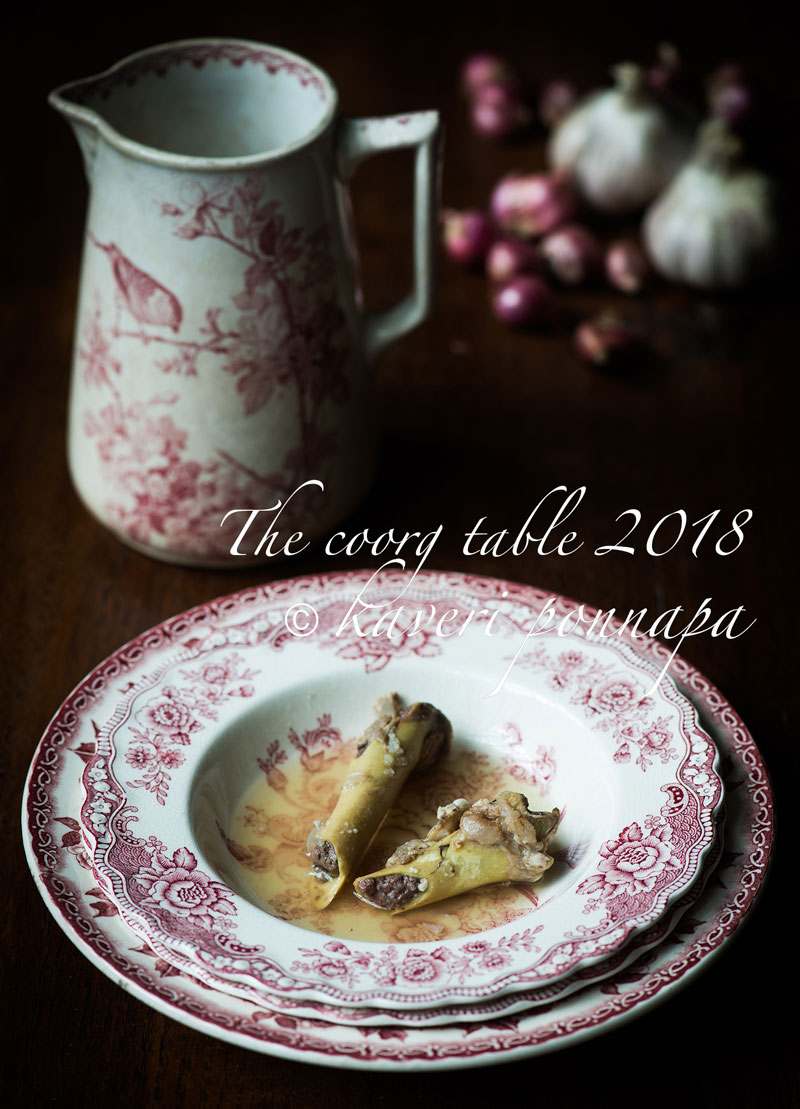 Jug soup is a general pick-me-up for anyone feeling a little under the weather. Of course, pressure cookers have taken over the role of the crockpot, but the essence remains the same. It is also a particularly tasty, satisfying, and important part of the menu for brand new mothers: nutrient rich, nourishing and easy to digest. For all the simplicity of the ingredients that go into it, an enticing aroma steals all around the house when the vessel containing this broth is un-lidded, redolent with the scents of onions, pepper and a certain luxurious quality that can only be described as onctueuse, drawing you involuntarily towards the kitchen. I always associate eating this with the monsoons in Coorg -dark, damp, cold and persistently wet -sadly, a season that seems to have gone forever; and of drinking quenching mugs full when my children were newborns. I love this soup, with its soothing flavours and aroma, its translucent surface covered with a thin film of gold so important to replenish your reserves. It managed to set right all the troubles in the world -or at least, most of them.
Jug soup is a general pick-me-up for anyone feeling a little under the weather. Of course, pressure cookers have taken over the role of the crockpot, but the essence remains the same. It is also a particularly tasty, satisfying, and important part of the menu for brand new mothers: nutrient rich, nourishing and easy to digest. For all the simplicity of the ingredients that go into it, an enticing aroma steals all around the house when the vessel containing this broth is un-lidded, redolent with the scents of onions, pepper and a certain luxurious quality that can only be described as onctueuse, drawing you involuntarily towards the kitchen. I always associate eating this with the monsoons in Coorg -dark, damp, cold and persistently wet -sadly, a season that seems to have gone forever; and of drinking quenching mugs full when my children were newborns. I love this soup, with its soothing flavours and aroma, its translucent surface covered with a thin film of gold so important to replenish your reserves. It managed to set right all the troubles in the world -or at least, most of them.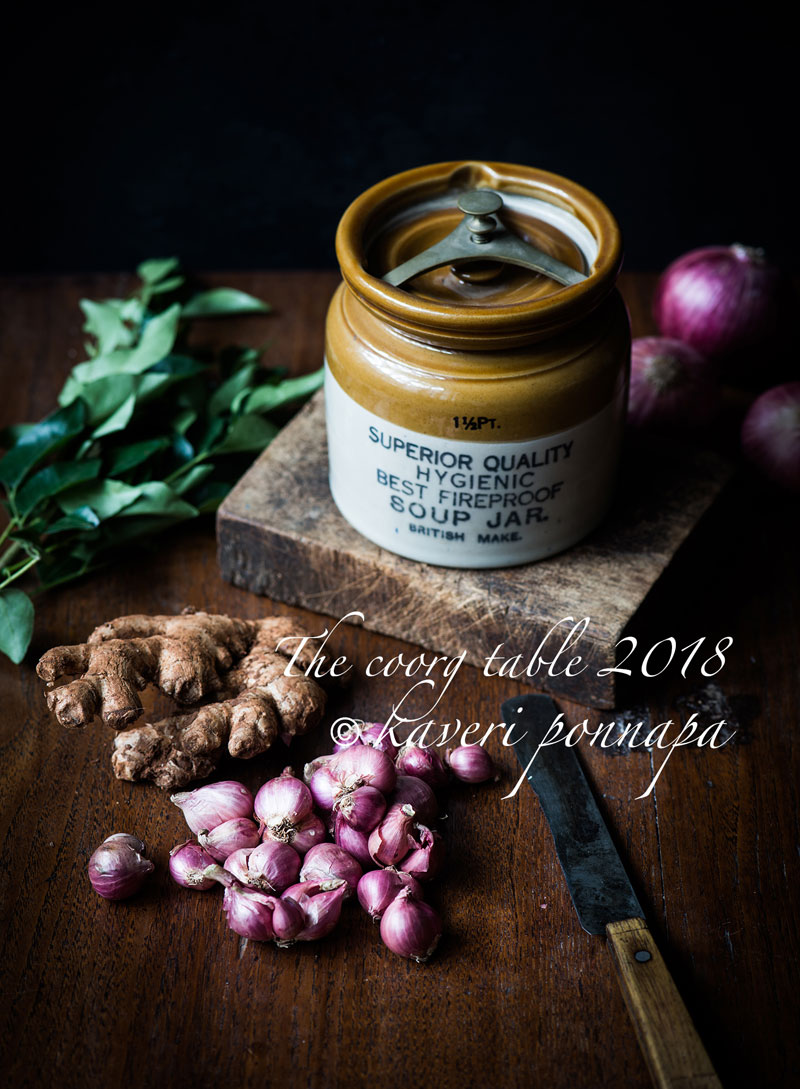 Some years ago, I found a beautiful old glazed stoneware jar in an antique store. It said ‘Soup Jar’ and it was stamped ‘British Made’. Curious, and an enthusiastic antique hunter, I could not resist buying it. I spent days trying to trace the story of this jar. Since the broth we make in Coorg has a well-established lineage and is made in parts of Kerala too, I wondered if there was a connection between the old jar I had bought and the soup with which we are so familiar. Was there a soup that went by the same name in Britain? Was it a different soup made in a similar way? A little reading and research revealed that ‘Jug’ referred to a British cooking technique. It was often referred to a jug, sealed and placed in another vessel of simmering water, essentially a double boiler, and the contents slow-cooked over several hours. This sounded remarkably like our Jug Soup. But here the similarity ended. The typical dish cooked this way was jugged hare; and Colonel Kenny-Herbert, who wrote extensively on cooking for the British in India in the 19th century, makes a mention of jugged chops. But nowhere, so far, have I been able to find a reference to ‘Jug Soup’ in British colonial cookery. So, was this fascinating old jar and others like it manufactured in Britain just for the Indian market? Since it is a foreign word, did we just substitute the more familiar barani, the multi-purpose crockpot used for storage, preserving and pickling in India with the English name ‘jug’, since this particular broth is also referred to as nalla mollu kanni, distinguishing it from another thin broth made differently, without meat and bones? Could the name have crept into Coorg and Kerala kitchens as the colonial influence increased in the 19th century? There are no certain answers yet, but between spoonfuls of freshly made jug soup, I have plenty of time to think over this one.
Some years ago, I found a beautiful old glazed stoneware jar in an antique store. It said ‘Soup Jar’ and it was stamped ‘British Made’. Curious, and an enthusiastic antique hunter, I could not resist buying it. I spent days trying to trace the story of this jar. Since the broth we make in Coorg has a well-established lineage and is made in parts of Kerala too, I wondered if there was a connection between the old jar I had bought and the soup with which we are so familiar. Was there a soup that went by the same name in Britain? Was it a different soup made in a similar way? A little reading and research revealed that ‘Jug’ referred to a British cooking technique. It was often referred to a jug, sealed and placed in another vessel of simmering water, essentially a double boiler, and the contents slow-cooked over several hours. This sounded remarkably like our Jug Soup. But here the similarity ended. The typical dish cooked this way was jugged hare; and Colonel Kenny-Herbert, who wrote extensively on cooking for the British in India in the 19th century, makes a mention of jugged chops. But nowhere, so far, have I been able to find a reference to ‘Jug Soup’ in British colonial cookery. So, was this fascinating old jar and others like it manufactured in Britain just for the Indian market? Since it is a foreign word, did we just substitute the more familiar barani, the multi-purpose crockpot used for storage, preserving and pickling in India with the English name ‘jug’, since this particular broth is also referred to as nalla mollu kanni, distinguishing it from another thin broth made differently, without meat and bones? Could the name have crept into Coorg and Kerala kitchens as the colonial influence increased in the 19th century? There are no certain answers yet, but between spoonfuls of freshly made jug soup, I have plenty of time to think over this one.
All Food Styling: Kaveri Ponnapa
Photo Credits: A.G.P Sathyaprakash
Do look out for the recipes of all the food featured here in my upcoming cookbook.

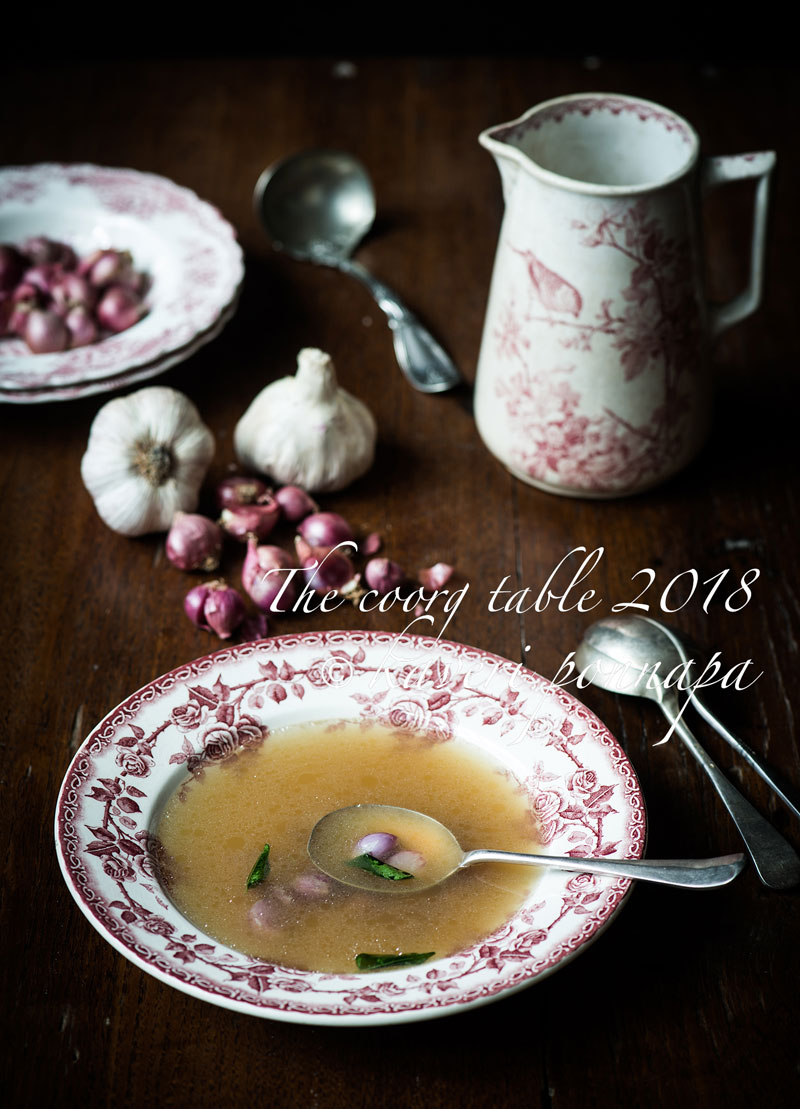
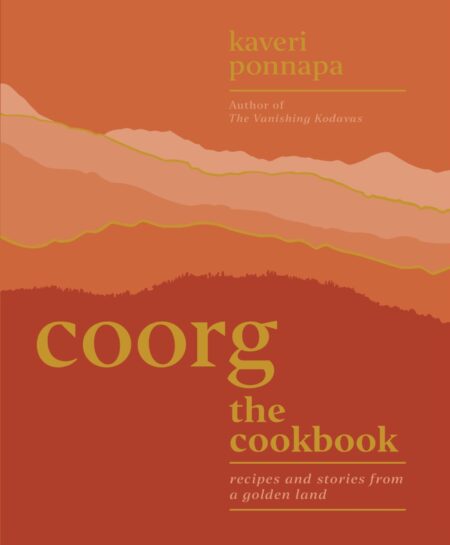

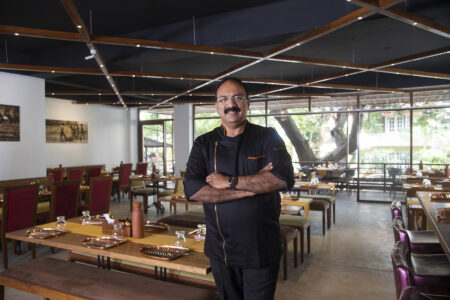
Love the photographs!
Thank you very much, Anu. Kaveri
Dear Kaveri,
I lived in Bangalore for 17 beautiful years, and loved every minute there. I had friends from Coorg, visited it, and loved that land too.
I can identify with your work – I have a similar family home in Dandeli, and am fortunate to have had a childhood growing up in the forest.
Having worked in many advertising agencies as an Art Director, I follow your writing whenever I can. but what really draws me to it are your photographs.
I have seen a bit of food styling, but yours is by far the best, because apart from aesthetics, you infuse your work with a soul, and that is so difficult to achieve, and so precious. Every frame is full of beauty, nostalgia and brings to mind a different time and place. Rare to find in today’s ‘instant’ world. Thank you for your lovely work, and All the very Best.
Hello Mena, welcome to The Coorg Table! Thank you so much for taking the time to share your thoughts and very generous response to these pages, it means a great deal to me. Dandeli is another magical part of the world, one that I have seen only a tiny portion of-you are very privileged to have grown up there, I’m sure the memories sustain you in every way. Since I am a completely self-taught food stylist, you have no idea how wonderful it it to hear this from an Art Director! I always hope that the pictures will transport the reader ‘elsewhere’ even for a short while.Please keep visiting, whenever you can.Warm wishes. Kaveri
This was a fascinating read! My mother, now 80, who grew up in a small town in Assam, talks of ‘jug soup’ that would often arrive from the local British Sahib’s house. My grandfather was a prominent lawyer, and was probably friendly with the Sahibs. Although we were non-vegetarians, this pot of soup was never allowed into the house. It was a kept at a table in the outside veranda; everyone drank cupfuls of it there. So perhaps some version of this soup was a pan-Indian British delicacy. 😊
Vandana, thank you very much for reading, and for sharing this valuable slice of culinary history. As I have mentioned, stock cooked in a ‘Barani’ an earthen crockpot, sealed with dough, and then strained and seasoned, was very much a part of the ancient food traditions of Coorg (nalla mollu kanni) and neighbouring Kerala. How it acquired a new name and perhaps transitioned into the kitchens of the local sahibs is quite intriguing -maybe it followed in the wake of mulligatawny? Thanks again for sharing, and I would love to hear from you if you come across any other references. In the meanwhile, do keep reading these pages. Kaveri
Yum !! Sounds like its not just comfort food, but good for you too..
And that it is-both comfort food and very nourishing. It’s worth taking advantage of all the good things it offers in just a bowlful. Kaveri
As always wonderful writing with nice images and antique vessels. I have heard jug soup is good for bones. I guess it is like leg soup but me not sure on this. Thanks for all your wonderful posts!!
Yes, it is very good for the bones, and high in protein too, Kaverappa. This one uses meat on the bone.The other soup is ‘Aad kaal’ soup, which is different in that it uses goat trotters. It is also very rich in nutrients, and used to nurse people back to good health after an illness-or enjoyed as a good, hearty soup. Thank you for your interest and responses, they always make me want to get back into the kitchen to try out another dish! Warm wishes.Kaveri
Just recovered from a cold and had a good serving of this. Most comforting when you live away from home and fall sick:) Lovely write up, as always.
I’m so glad you’re better, Pooja. Isn’t this simply the best soup to set you back on your feet? And simple to make, too. Thank you very much for writing. Kaveri